A white horse stark against a black beach. A family pushes a car through floodwaters in Chiayi County. People play on a beach in Pingtung County, as a nuclear power plant looms in the background.
These are just some of the powerful images on display as part of Shen Chao-liang’s (沈昭良) Drifting (Overture) exhibition, currently on display at AKI Gallery in Taipei.
For the first time in Shen’s decorated career, his photography seeks to speak to broader, multi-layered issues within the fabric of Taiwanese society.
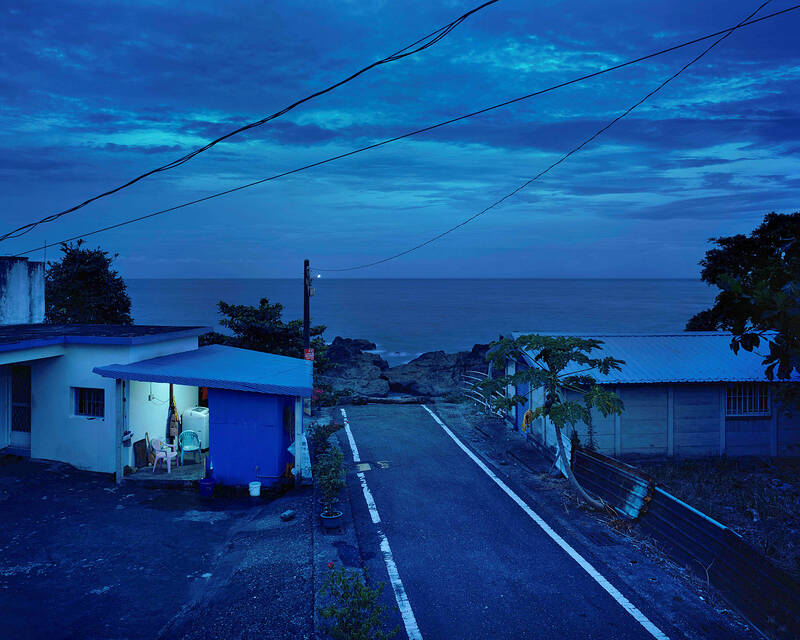
Photo courtesy of the artist and AKI Gallery
The photographs look towards history, national identity, ecological changes and more to create a collection of images speaking on the country’s contemporary context.
“Can I use landscapes to describe a country?” Shen said to an assembled panel last Saturday at AKI Gallery.
‘THEY ARE SILENT’
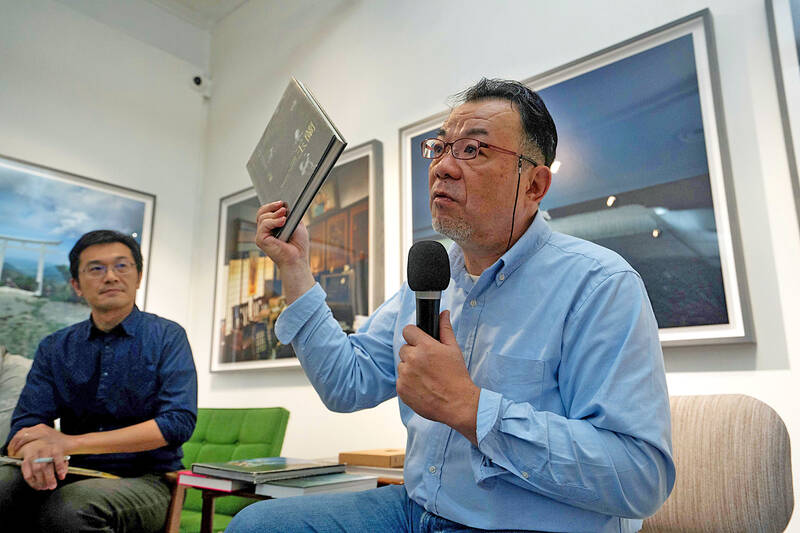
Photo: Lery Hiciano, Taipei Times
Shen’s resume is impressive — previous projects have led him to exhibitions in Taiwan, Japan and South Korea, on subjects as diverse as local entertainers to earthquake survivors and religious festivals.
But with those in-depth projects came a need to embed himself with his subjects in order to communicate their stories.
In a stark departure from his previous work, like Stage, Tsukiji Fish Market (築地魚市場) or Taiwan Vaudeville Troupes (台灣綜藝團), the photographs in Drifting (Overture) do not center people. In his words, “they are silent.”
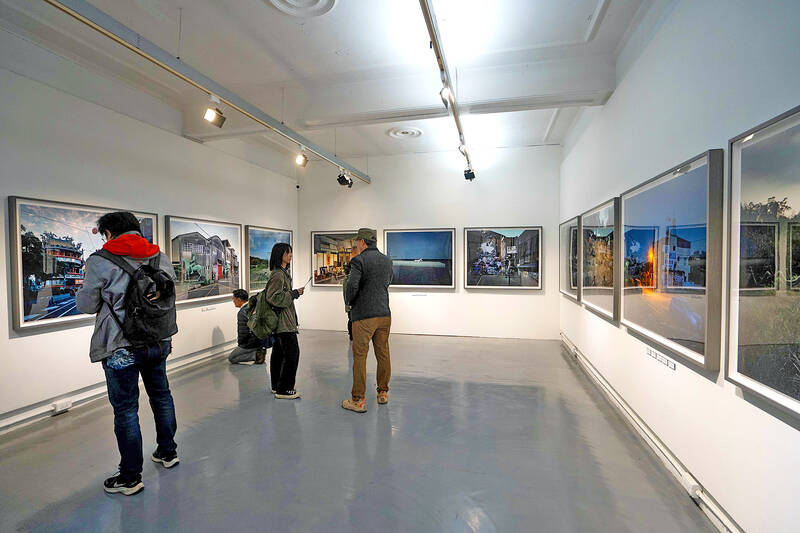
Photo: Lery Hiciano, Taipei Times
“The older I get, the less I want to talk to people,” Shen said to audience laughter.
The lack of people in the photographs speaks to the environment of Taiwan, both human-made and naturally-occurring, the country’s changing identity and anxieties about what it means to be Taiwanese.
This project took 10 years to complete, spanning three presidential administrations, a global pandemic, Taiwan’s entry into mainstream international political debates, and much more.
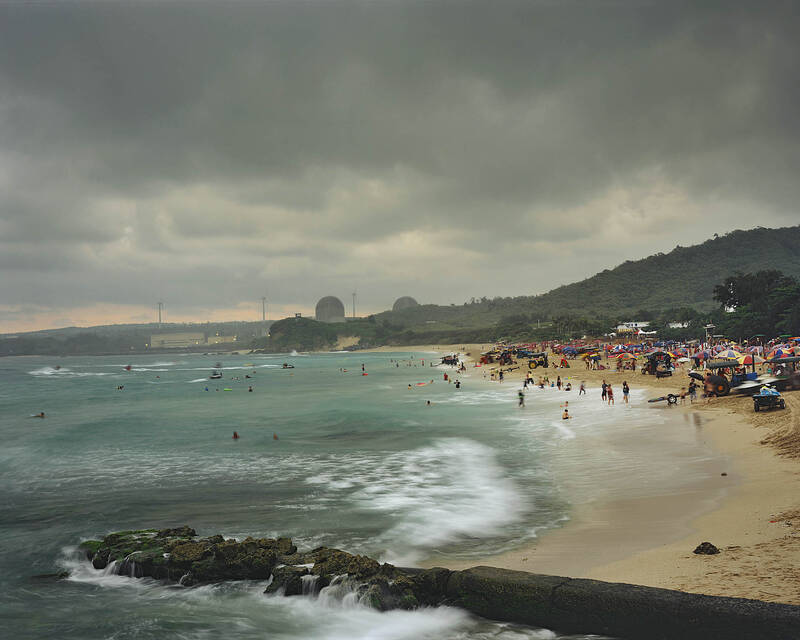
Photo courtesy of the artist and AKI Gallery
For those unaware of Taiwan’s history, the photographs may seem to lack a narrative, but the length of time spent on this project speaks to the artists’ attentiveness and the care placed in selecting each image.
For example, one photograph of an empty street in New Taipei City shows two larger-than-life statues of Chiang Kai-shek (蔣介石) and Chiang Ching-kuo (蔣經國).
To those unfamiliar with the ongoing controversies around the Chiang family and the debate over transitional justice, it may be difficult to identify their importance at first sight, but the solitary statues, devoid of attention in an anonymous corner of the city but still in immaculate condition, speak to how modern society continues to grapple with the two former leaders.
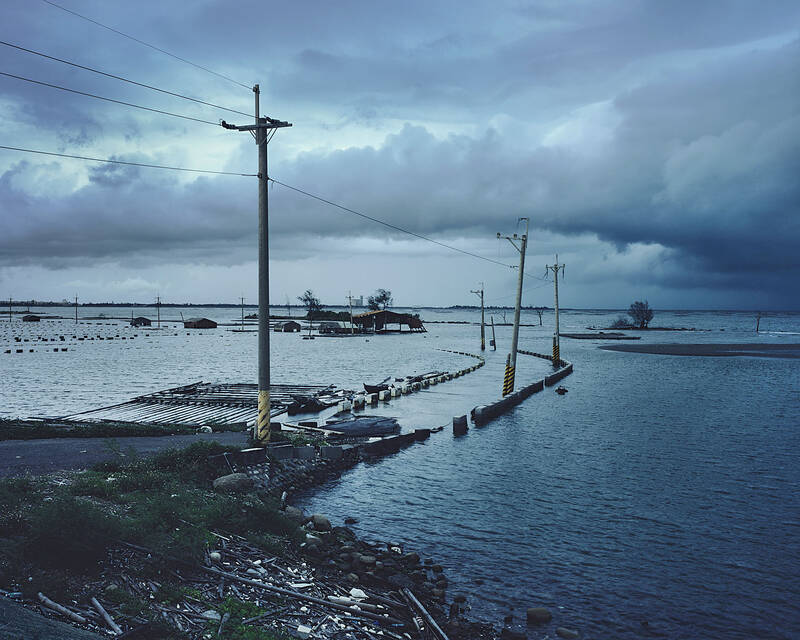
Photo courtesy of the artist and AKI Gallery
‘SEARCH FOR DIRECTIONS’
Touching on Taiwan’s history, including issues like the White Terror period of martial law, Shen said, “The Taiwanese experience is like a boat searching for directions.”
The controversies around the Chiang family are emblematic of that search.
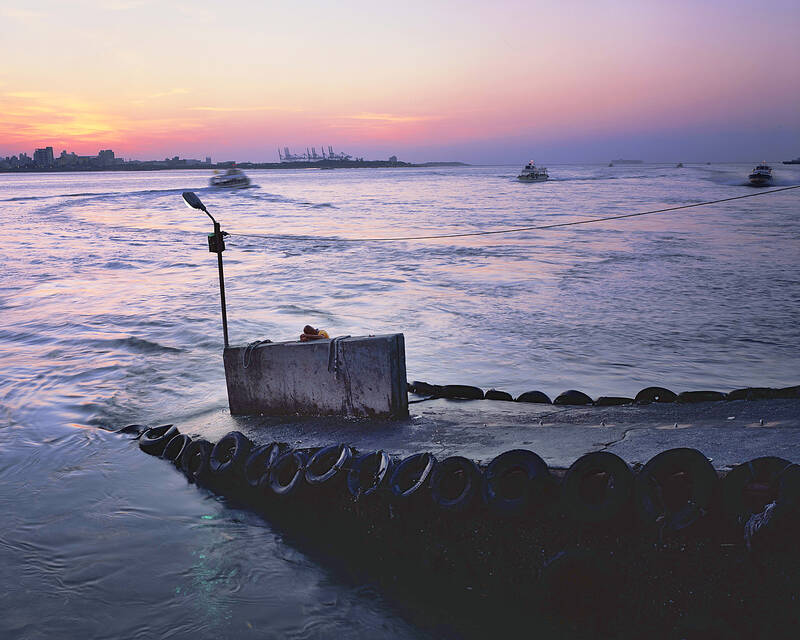
Photo courtesy of the artist and AKI Gallery
Shen’s fellow panelist asked the artist about the lack of photographs touching on COVID-19, saying the empty images “feel like they’ve been taken after a catastrophe.”
The pandemic led to him reflecting on Taiwan’s past, present and future, the artist said, adding that he never stopped waking up early to photograph his surroundings.
When asked by the Taipei Times when he knows he has taken enough photographs to consider a project completed, Shen said that his goal was to move away from his former photojournalist background and desire to view his photographs “impartially” to communicate his story.
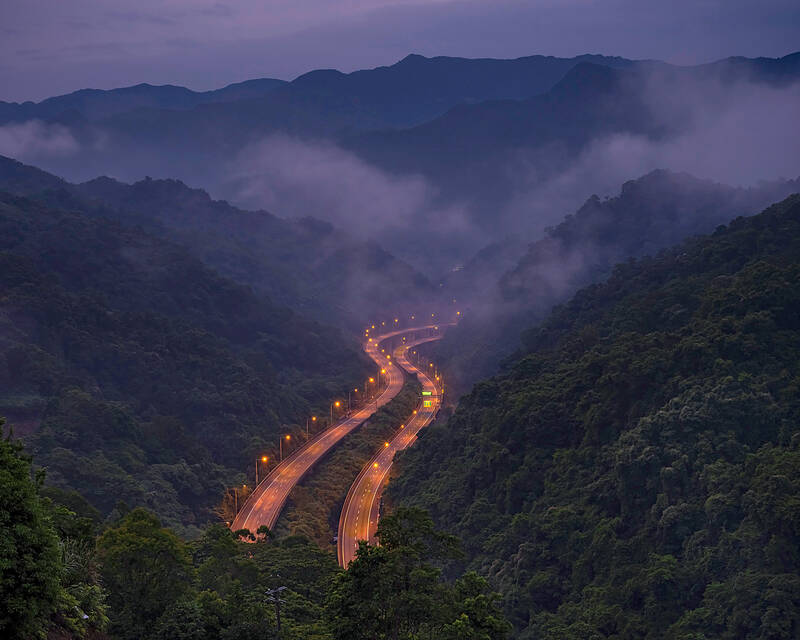
Photo courtesy of the artist and AKI Gallery
When asked how a photographer can look at their own work objectively, Shen said that objectivity and subjectivity are far less important than perspective.
Comparing it to photojournalism, where a photographer takes 100 photographs only to have one ultimately selected by the newspaper for a story, Shen asked rhetorically, “is that process objective?”
“There is no objective, subjective or absolute.”
To Shen, photography is about expressing his own ideas and meeting his own needs.
“What are you trying to say? You cannot lose your perspective in the search for objectivity.”
The exhibition’s brochure says that the “invisible” truths of history “shape our destiny and potential visions.”
Shen, one can say, makes these invisible truths visible.
One can see the invisible in a loaded image of an empty room filled with mementos and paperwork of bygone eras, a gray industrial facility nestled within green mountains or in the silhouettes of excavators digging through the rubble caused by an earthquake.
All these and more are now on display as part of Drifting (Overture).
“I wanted to use landscapes to unleash the essence of photography,” Shen said.

Taiwan has next to no political engagement in Myanmar, either with the ruling military junta nor the dozens of armed groups who’ve in the last five years taken over around two-thirds of the nation’s territory in a sprawling, patchwork civil war. But early last month, the leader of one relatively minor Burmese revolutionary faction, General Nerdah Bomya, who is also an alleged war criminal, made a low key visit to Taipei, where he met with a member of President William Lai’s (賴清德) staff, a retired Taiwanese military official and several academics. “I feel like Taiwan is a good example of

March 2 to March 8 Gunfire rang out along the shore of the frontline island of Lieyu (烈嶼) on a foggy afternoon on March 7, 1987. By the time it was over, about 20 unarmed Vietnamese refugees — men, women, elderly and children — were dead. They were hastily buried, followed by decades of silence. Months later, opposition politicians and journalists tried to uncover what had happened, but conflicting accounts only deepened the confusion. One version suggested that government troops had mistakenly killed their own operatives attempting to return home from Vietnam. The military maintained that the

Before the last section of the round-the-island railway was electrified, one old blue train still chugged back and forth between Pingtung County’s Fangliao (枋寮) and Taitung (台東) stations once a day. It was so slow, was so hot (it had no air conditioning) and covered such a short distance, that the low fare still failed to attract many riders. This relic of the past was finally retired when the South Link Line was fully electrified on Dec. 23, 2020. A wave of nostalgia surrounded the termination of the Ordinary Train service, as these train carriages had been in use for decades

Lori Sepich smoked for years and sometimes skipped taking her blood pressure medicine. But she never thought she’d have a heart attack. The possibility “just wasn’t registering with me,” said the 64-year-old from Memphis, Tennessee, who suffered two of them 13 years apart. She’s far from alone. More than 60 million women in the US live with cardiovascular disease, which includes heart disease as well as stroke, heart failure and atrial fibrillation. And despite the myth that heart attacks mostly strike men, women are vulnerable too. Overall in the US, 1 in 5 women dies of cardiovascular disease each year, 37,000 of them